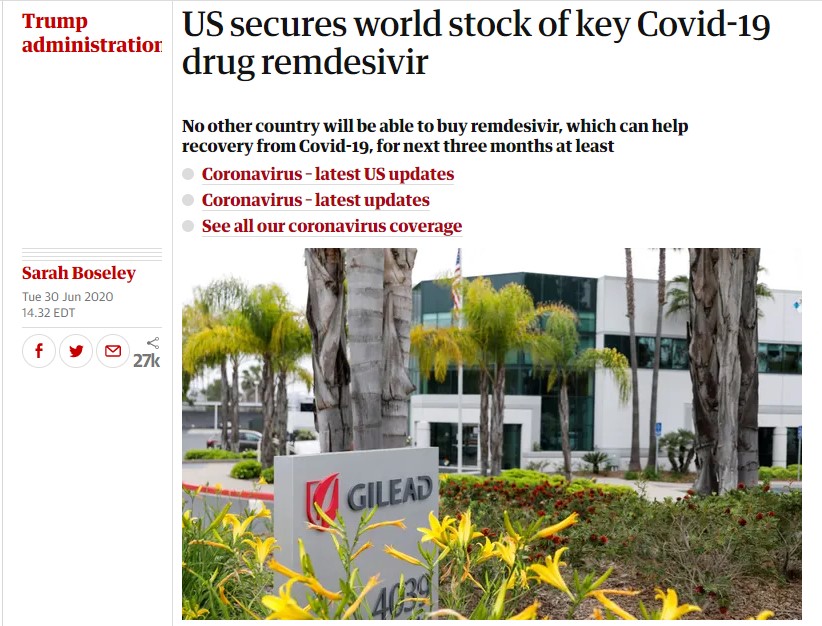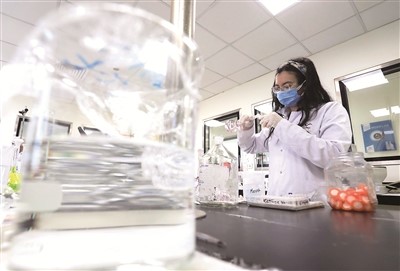


Screenshot of the report by The Guardian
The US has bought up virtually all the stocks for the next three months of remdesivir, which can help patients recover from COVID-19, leaving none for most of the rest of the world, reported The Guardian on June 30.
Remdesivir is the first drug approved by licensing authorities in the US to treat COVID-19, and as it is under patent to Gilead, no other company in wealthy countries can make it. The Trump administration has now bought more than 500,000 doses, which is all of Gilead’s production for July and 90% of August and September, the report said.
The deal was announced as the pandemic spirals out of control in the US. According to Anthony Fauci, the country’s leading public health expert and director of the National Institute of Allergy and Infectious Diseases, coronavirus cases are expected to go up to 100,000 a day if the trend isn’t turned around.
Alex Azar, US health and human services secretary, said President Trump has struck “an amazing deal to ensure Americans have access to the first authorized therapeutic for COVID-19”.
The move, made with an “America first” attitude, immediately met with a strong international backlash, with critics saying the US move to buy up so much stock from Gilead itself hinders international cooperation on COVID-19.
Canadian Prime Minister Justin Trudeau warned there could be unintended negative consequences if the US continued to outbid its allies, said the report.
Thomas Senderovitz, head of the Danish Medicines Agency, told Danish broadcaster DR that the move could endanger Europeans and others down the road. “I have never seen anything like that. That a company chooses to sell their stock to only one country. It’s very strange and quite inappropriate,” he said.
“The trial that gave the result that allowed remdesivir to sell their drug wasn’t just done in the US. There were patients participating through other European countries, in the UK as well, and internationally, Mexico and other places,” Oxford University’s Prof Peter Horby told BBC Radio 4.
Dr. Michael Ryan, the emergencies chief of the World Health Organization, said the agency was looking into the implications of the U.S. deal for remdesivir.
“There are many people around the world who are very sick .... and we want to ensure that everybody has access to the necessary, life-saving interventions.” Ryan said the WHO was “fully committed” to working toward equitable access for such treatments, according to a report by France 24.
Controversy remains

(Photo/Xinhua)
The effectiveness of remdesivir has long been a controversial issue. A study published by The Lancet on April 29 found that treatment with the antiviral drug does not speed recovery from COVID-19 compared with placebos in hospitalised patients who are critically ill.
Data published in the New England Journal of Medicine shows that the drug’s mortality rates were negligible, but it did show modest effects, shortening average recovery time to 11 days from 15 in hospitalized patients with the coronavirus.
While scientists are continuing to evaluate the safety and efficacy of the drug, it is now regarded by many as a beacon of hope in the pandemic. On July 3, the European Commission granted conditional marketing authorization for remdesivir, making it the first medicine authorized at EU level for treatment against COVID-19. South Korea, Japan, India and Singapore have also approved the drug for emergency use, wrote Reuters.
Meanwhile, countries around the world are actively looking for other safe, effective and economical treatments for COVID-19. On June 19, the Indian government approved Favipiravir, manufactured by Glenmark Pharmaceuticals, to treat mild to moderate cases of COVID-19 in the country, the first approved oral medication in India for the treatment of coronavirus.
The initial clinical trial results from the United Kingdom show that dexamethasone can be lifesaving for patients who are critically ill with COVID-19. For patients on ventilators, the treatment was shown to reduce mortality by about one third, and for patients requiring only oxygen, mortality was cut by about one fifth.

 Award-winning photos show poverty reduction achievements in NE China's Jilin province
Award-winning photos show poverty reduction achievements in NE China's Jilin province People dance to greet advent of New Year in Ameiqituo Town, Guizhou
People dance to greet advent of New Year in Ameiqituo Town, Guizhou Fire brigade in Shanghai holds group wedding
Fire brigade in Shanghai holds group wedding Tourists enjoy ice sculptures in Datan Town, north China
Tourists enjoy ice sculptures in Datan Town, north China Sunset scenery of Dayan Pagoda in Xi'an
Sunset scenery of Dayan Pagoda in Xi'an Tourists have fun at scenic spot in Nanlong Town, NW China
Tourists have fun at scenic spot in Nanlong Town, NW China Harbin attracts tourists by making best use of ice in winter
Harbin attracts tourists by making best use of ice in winter In pics: FIS Alpine Ski Women's World Cup Slalom
In pics: FIS Alpine Ski Women's World Cup Slalom Black-necked cranes rest at reservoir in Lhunzhub County, Lhasa
Black-necked cranes rest at reservoir in Lhunzhub County, Lhasa China's FAST telescope will be available to foreign scientists in April
China's FAST telescope will be available to foreign scientists in April